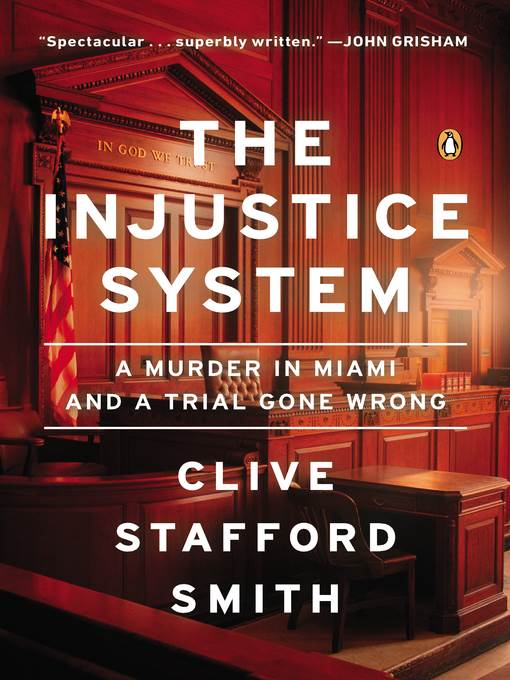
The Injustice System
A True Story of Crime and Punishment
کتاب های مرتبط
- اطلاعات
- نقد و بررسی
- دیدگاه کاربران
نقد و بررسی

November 12, 2012
Smith, a longtime defense attorney specializing in capital crimes in Louisiana, focuses on the case of Krishna Maharaj, a successful businessman convicted of the 1986 Miami murder of his former partner, Derrick Moo Young, and Moo Young's son. As Smith, who handled Maharaj's appeals, digs through Maharaj's case, he uncovers a shocking web of prosecutorial misconduct, apparent defense incompetence, judicial corruption, and the possible involvement of Colombian drug cartels. Despite uncovering all of these things, Smith was still unable to get the legal system to give Maharaj a fair retrial, and while his sentence has been reduced to life imprisonment, he is still in jail for a crime insists he did not commit, a claim supported by several alibi witnesses. By focusing on and exhaustively researching the Maharaj case, Smith (The Eight O'Clock Ferry to the Windward Side) exposes flaws in the legal system as a whole, and forces readers to confront unpleasant truths and their preconceived notions of criminals, justice, and jurisprudence.

Starred review from October 1, 2012
Stinging account of a questionable 1986 death penalty case by the lawyer who tried to get it overturned. By the time Smith (Eight O'Clock Ferry to the Windward Side: Seeking Justice in Guantanamo Bay, 2007, etc.) became involved in the case of Kris Maharaj, the once-wealthy Trinidadian businessman of Indian heritage had been convicted and sentenced to death in Miami for the murder of a former business partner and his son. Smith received a request to examine the conviction from British diplomatic officials. Despite an already overwhelming workload at his New Orleans public-interest law firm (which seeks justice for indigent defendants victimized by unfair trials) and the lack of a budget to pay him, Smith said he would investigate. He sensed quickly from reading the trial transcript that Maharaj had been railroaded. While gathering evidence, Smith pieced together a grim scenario of a conviction based on the machinations of a crooked homicide detective, cheating prosecutors, biased forensic experts, a dishonest judge and appellate justices determined to uphold it no matter how strongly new information suggested Maharaj's innocence. Worst of all, the author determined that the defendant's original trial lawyer had been grossly incompetent and may have intentionally lost the case because of threats made against his family. As the chronicle ends, Smith sees no realistic hope for exoneration, even though he can present an alternative solution that involves South American drug dealers (who had nothing to do with Maharaj) and includes the identities of the actual murderers. In the author's view, the case is a glaring, but by no means unique, example of massive flaws in the American criminal justice system. A wrongful-conviction saga different from most others because there is no justice at the end.
COPYRIGHT(2012) Kirkus Reviews, ALL RIGHTS RESERVED.

January 1, 2013
Smith (Eight O'Clock Ferry to the Windward Side: Seeking Justice in Guantanamo Bay), a veteran defender of criminal cases, first became involved with Krishna Maharaj in 1994 as the Trinidadian man faced execution for the murders of two Jamaican businessmen in Miami. The book is organized around Maharaj's more than 25 years in the criminal justice system and the actors involved. Smith combines details of this conviction with related cases and policy issues. Using forensic accounting techniques and historical insights into the drug wars of that era, he argues that the defendant was falsely convicted. Significant but fairly technical issues about the appeals process through the Supreme Court level are raised along with a thoughtful discussion of victims' rights in the United State. VERDICT Although the narrative may be too policy-oriented for casual readers of true crime, its scope and human-interest angle will engage concerned citizens and students of the criminal justice system. This is a well-written, detailed, and intriguing case study of justice denied from a crusading insider's perspective.--Antoinette Brinkman, formerly of the Southwest Indiana Mental Health Ctr. Lib., Evansville
Copyright 2013 Library Journal, LLC Used with permission.

November 15, 2012
Kris Maharaj spent more than 20 years on death row, convicted of murdering his exbusiness partner, bankrupt and deserted by everyone but his wife. Smith, who had spent 25 years fighting death-penalty cases, took up Maharaj's cause and plunged into an investigation involving the murky world of international drug trafficking and money laundering. Smith's investigation took him from the Caribbean to Miami and Washington, D.C., as he examined his client, a British-educated Trinidadian businessman who'd lived in Miami, and the business deal that landed Maharaj in prison despite a strong alibi. His investigation uncovered improper conduct by police, prosecutors, and the judge, giving Smith the basis for critically analyzing the frailties of the justice system. He shines a harsh light on the conventional belief that the innocent rarely go as far as trial and are seldom convicted, and the immunity of prosecutors from accusations of wrongdoing, including withholding evidence that could prove defendants innocent. Smith packages this revealing analysis of the broader justice system in a true-life legal thriller about one particularly egregious case.(Reprinted with permission of Booklist, copyright 2012, American Library Association.)

























دیدگاه کاربران